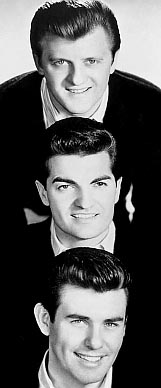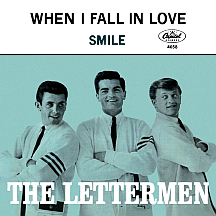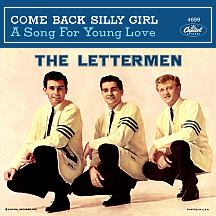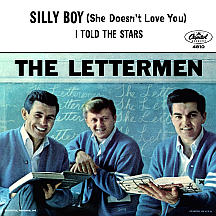THE LETTERMEN
Several college-focused vocal groups emerged in the latter half of the 1950s, taking a non-rock-and-roll position while catering to the same youthful music fans. Being an actual student was not a prerequisite, but performing at colleges and universities was a great way to build an audience; folk bands like The Kingston Trio and The Brothers Four did so regularly. More specific to the trendy academic image were The Four Freshmen and The Four Preps; live concert albums, often recorded at campus shows, were released by all these acts and others. The group that took this strategy the furthest was The Lettermen, who actually wore striped letterman sweaters (each sporting a large "L") on their first three Capitol albums, then exhibited a more dapper man-about-campus look on the cover of their fourth album, College Standards, before the record company repositioned them strictly as affable ambassadors of love and romance, an image that proved effective for a very long time.
Tony Butala was a professional singer as a child, starting his career at age eight with several live performances on KDKA radio in Pittsburgh. His family moved to Los Angeles around 1951, when he was eleven, and he became a member of the Robert Mitchell Boys Choir, a constantly-evolving group of young singers that had appeared in Hollywood films since the mid-1930s. He appeared with them in the early-'50s films On Moonlight Bay, War of the Worlds, Dr. Seuss fantasy The 5,000 Fingers of Dr. T. and Bing Crosby holiday classic White Christmas; his singing is also heard in Walt Disneys Peter Pan. Giving acting a try post-Choir, he had a sizeable role in 1958's low budget Dragstrip Riot (and even did some onscreen singing). Around this time he was in a short-lived vocal group called The Fourmost that included Riot co-star Connie Stevens. Within months he'd formed a group with Mike Barnett and Talmadge Russell and found work in a Las Vegas revue starring bandleader Paul Whiteman, featured as The Rhythm Boys, impersonating Whiteman's group of the same name from the '20s (of which Crosby was a member). Shortly afterwards the trio showed up in L.A. using the Lettermen name, but it took several lineup changes before a more permanent trio, with Tony the only original member, was put in place.
Bob Engemann, a student at Brigham Young University in Provo, Utah, was in a vocal trio with his brother Karl Engemann and Karl's wife Gerri. When Warner Bros. Records was established in 1958, Karl went to work there as a producer and A&R man. Former BYU student Jim Pike was recording for the label as a solo singer and had one single, a haunting jazz-pop tune called "Lucy D" featuring The Damons, a one-woman, three-man backing group. Tony, meanwhile, did some solo sides for the small Topic label with "Purple People Eater" keeper Sheb Wooley. "Long Black Stockings" and "Look at Him, Look at Her," both penned by Sheb, oozed teenage rock with a novelty lean, a far cry from the technique Tony would soon be taking. Engemann, Butala and WB signee Pike came together in the later months of 1959; in 1960, they recorded the Bobby Troup ballad "Their Hearts Were Full of Spring" and took it to Karl, who arranged to have them signed to Warner Bros.
All three were baritones, an unusual configuration that had them trading off lead vocal roles while Jim did an occasional falsetto. The act's direction was uncertain; chanting novelty "The Magic Sound" went nowhere and by year's end the WB gig was toast. Within months the trio had joined the Capitol roster, where they prospered under the direction of producer Nick Venet, who made the most of their flair for harmony and interchangeable lead vocals. Lead single "The Way You Look Tonight," penned by Dorothy Fields and Jerome Kern for the 1936 Fred Astaire-Ginger Rogers musical Swing Time, connected with adults as well as teens and reached the top 20 in October '61, later earning them a Grammy nomination for Best Performance by a Vocal Group; they were also up for Best New Artist (the win went to pianist Peter Nero). The next single, "When I Fall in Love," became the top seller among many versions of the song by composers Victor Young and Edward Heyman first heard almost a decade earlier. It reached Billboard's top ten in January 1962 and hit number one on the Easy Listening chart. Jimmie Haskell's near-identical arrangements positioned the Lettermen in a soft, romantic category they had no wish to vacate.
Having witnessed many of the top acts in Vegas, the group worked hard at developing a well-rounded stage show with comedy, audience participation and more variety in song selection than could be found in their vinyl catalog. The trio often played instruments onstage (they were all guitarists and as a bonus Jim picked banjo) and included a folk music set (a bandwagon worth jumping on) in most early shows. While much material was mined from decades past, they also did contemporary top 40-friendly songs like "Bomp" guy Barry Mann's "Come Back Silly Girl" (top 20 in March '62) and the Barry DeVorzon-Eddy Carroll ditty "How is Julie?" While goofing around one night, Jim and Bob improvised a parody of Real McCoys star Walter Brennan's sentimental surprise hit "Old Rivers." The result, "(Son Of) Old Rivers," even more of a novelty than "Magic Sound" (which hadn't been to their liking), was issued by Capitol under the name Tony, Bob and Jimmy (though Butala had nothing to do with it). It didn't strike many fancies, which was probably for the best.

Album sales were consistently strong (Capitol insisted on at least three new LPs per year...36 completed masters...minimum!) and performance dates were booked for months in advance. Idle time was scarce...they were constantly touring. 45s barely charted until 1965, when a vocal version of Max Steiner's six-year-old "(Theme from) A Summer Place" (lyrics by Mack Discant) made them hitmakers once again in the summer of '65. A mainstay of mid-decade Middle-Road radio formats, their best results came with established songs (Jimmie Rodgers' 1958 hit "Secretly," 1930s chestnut "I Only Have Eyes For You" and Bill Pursell's 1963 instrumental hit "Our Winter Love," a tune by Canadian trumpeter Johnny Cowell with Bob Tubert's lyrics) as the Lettermen sound gradually became more predictable but no less popular.
Stage shows had been perfected to a degree that the word spread far and wide: the group had to be seen in concert to be fully appreciated. The fall 1967 album The Lettermen!!!...and "Live!" drove home this point and produced the act's biggest hit, a medley of "Goin' Out of My Head" (introduced by Little Anthony and the Imperials in '64) and the more recent Frankie Valli smash "Can't Take My Eyes Off You." If it didn't seem at first that such a pairing would achieve major hit status, a lengthy stay on radio playlists and top ten ranking in February '68 made the medley concept viable for future works...plus it landed the guys their fourth Grammy nomination (though they were never winners). About the time the song revitalized the group's standing, Bob Engemann left and was replaced by Jim's brother, Don Pike, in a soon-to-be regular routine of lineup-shuffling.
Singer-songwriter Kelly Gordon had begun producing their sessions and his fresh approach suited them; Gordon and Dave Grusin composed the theme for the Doris Day film "Where Were You When the Lights Went Out?," a summer '68 comedy set during the November '65 Northeast U.S. power blackout. In one of the few instances where Doris didn't sing the theme for a movie she starred in, vocal duty was assigned to the Lettermen. Jim Pike took his first shot at solo success since '59 with "No Other Love" on Capitol, getting nowhere with it. In the summer of 1969, Tony and the Pike brothers scored a big hit with another Little Anthony number, "Hurt So Bad." They relied almost exclusively on tried-and-true oldies for single releases in '69 and '70 with a string of minor chart 45s to help boost album sales, tapping the inventory of Paul Anka ("Put Your Head on My Shoulder"), Robert Maxwell and Vic Dana ("Shangri-La"), Classics IV and Elvis Presley ("Traces/Memories Medley"), Jay and the Americans ("She Cried") and Freddie Scott ("Hey, Girl"). They also supplied the second season theme for NBC-TV's drama series Bracken's World, titled "Worlds."
More solo projects fell flat, including a third try with Jim (a remake of The Neon Philharmonics's 1969 hit "Morning Girl") and a final attempt from Tony with Elton John and Bernie Taupin's "The Greatest Discovery." The group's last notable single came in 1971 with a cover of John Lennon's "Love." Jim lost his voice around 1974 and was forced to quit; the affliction lasted several years. Another brother, Donny Pike, came on board, and it's possible many fans barely noticed the difference. Tony Butala has kept The Lettermen going under the original name ever since with several newer members coming and going. In the early '80s, after the gradual recovery of Jim Pike's vocal cords, he and Bob Engemann formed a new trio, Reunion. With a very similar sound (frequently incorporating the group's hits into performances), the slightly-off-center-Lettermen act was accessible to enlightened audiences for many years.
NOTABLE SINGLES:
- Lucy D - 1959
by Jim Pike with the Damons - Long Black Stockings - 1959
by Tony Butala - Look at Him, Look at Her - 1959
by Tony Butala - Their Hearts Were Full of Spring - 1960
- The Magic Sound - 1960
- The Way You Look Tonight - 1961
- When I Fall in Love - 1961
- Come Back Silly Girl - 1962
- How is Julie? /
Turn Around, Look at Me - 1962 - (Son Of) Old Rivers - 1962
as Tony, Bob and Jimmy - Silly Boy (She Doesn't Love You) - 1962
- Allentown Jail - 1963
- Where or When - 1963
- (Theme from) A Summer Place - 1965
- Secretly - 1965
- Sweet September - 1965
- I Only Have Eyes for You - 1966
- Chanson D'Amour - 1966
- Our Winter Love - 1967
- Goin' Out of My Head/Can't Take My Eyes Off You - 1968
- No Other Love - 1968
by Jim Pike - Where Were You When the Lights Went Out? - 1968
- Sherry Don't Go - 1968
- Put Your Head on My Shoulder - 1968
- Hurt So Bad - 1969
- Shangri-La - 1969
- Traces/Memories Medley - 1969
- She Cried - 1970
- Hey, Girl /
Worlds - 1970 - Morning Girl - 1971
as the Lettermen present Jim Pike - The Greatest Discovery - 1971
by Tony Butala - Everything is Good About You - 1971
- Love - 1971
- Eastward - 1975




